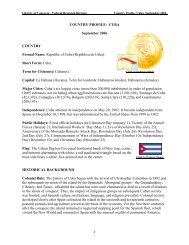1 - American Memory
1 - American Memory
1 - American Memory
Create successful ePaper yourself
Turn your PDF publications into a flip-book with our unique Google optimized e-Paper software.
167<br />
go again' attitude and a resultine behavior pattern that can be as<br />
I'ostly and as disruptive as would oe the case if the strike ultimately<br />
occurred."<br />
Tiie third chapter of this booiilet is a rather detailed analysis of<br />
possible solutions to this problem that Hawaii has faced for so long<br />
and after reviewing many alternative solutions, I concluded that the<br />
l)est solution from the viewpoint of all parties concerned is essentially<br />
the proposal that is contained in H.R. 7189.<br />
Now. could I make two points in support of H.R. 7189 ?<br />
The first point is that H.R. 7189 can in no way be considered anti-<br />
strike or antilockout legislation. I think in answer to Mr. Harvey's<br />
question, I don't think it is really labor legislation at all. It is com-<br />
merce legislation. Partial operation of a tiny fraction of a struck or<br />
locked-out industry in order to provide essential ser\-ice does not inter-<br />
fere with the collective bargaining process. In my studies, and these<br />
figures have been quoted already, I have determined that only about<br />
3 percent of the west coast longshore work force is engaged in han-<br />
dling goods outbound to or inbound from Hawaii.<br />
Adding Guam, <strong>American</strong> Samoa, and Trust Territory of the<br />
Pacific cargoes would increase that percentage fractionally but still<br />
leave it within the range of 3 percent. To have the west coast long-<br />
shore industry continue to work 3 percent of its work force, still leaves<br />
97 percent of the work force untouched. This would then be a 97-per-<br />
cent stoppage instead of 100-pcrcent stoppage. The economic pressures<br />
on both sides to the dispute would to all intents and purposes be un-<br />
diminished. The collective bargaining process would be essentially<br />
untouched. This being the case, this legislation can in no way be con-<br />
sidered antistrike or antilockout.<br />
My second point is that the concept of partial operation in the event<br />
of an industrywide strike is not a new concept nor is it new in practice.<br />
In practice, essential military cargoes have been exempted from long-<br />
shore and maritime stoppages providing partial operations to take<br />
care of essential military needs. The west coast longshore and mari-<br />
time industries have had extensive experience with partial operations<br />
during strike periods.<br />
Further, the concept of partial operations has been supported by<br />
such students of emergency disputes legislation as former Under-<br />
secretary of Labor, Larry Silberman and by David Cullen in his<br />
analysis called National Emergency Strikes published by Cornell<br />
University in 1968. This concept was embodied in the administration<br />
bill S. 560 of the last session and also was embodied in the Staggere-<br />
Williams bill, H.R. 359.") and S. 832. Finally, the Javits bill of the<br />
last session. S. 594. provided that the President could order partial<br />
operations of a struck industry under certain conditions.<br />
My conclusion is that this legislation would do practically nothing<br />
to interfere with the collective bargaining process and therefore can<br />
in no way be considered antistrike legislation and that the basic pro-<br />
posal of this legislation, partial operation of a strike industry, is an<br />
accepted concept and that the west coast maritime and longshore<br />
industries have had extensive experience with it in practice.<br />
Finally, let me express one very sincere hope: namely, that the Con-<br />
gress will act on this legislation at this time. In fact, that it would



![Albert Einstein Papers [finding aid]. Library of Congress. [PDF ...](https://img.yumpu.com/21604228/1/190x245/albert-einstein-papers-finding-aid-library-of-congress-pdf-.jpg?quality=85)





![American Colony in Jerusalem Collection [finding aid]. Library of ...](https://img.yumpu.com/17941275/1/190x245/american-colony-in-jerusalem-collection-finding-aid-library-of-.jpg?quality=85)



![Piccard Family Papers [finding aid]. - American Memory - Library of ...](https://img.yumpu.com/17941234/1/190x245/piccard-family-papers-finding-aid-american-memory-library-of-.jpg?quality=85)


